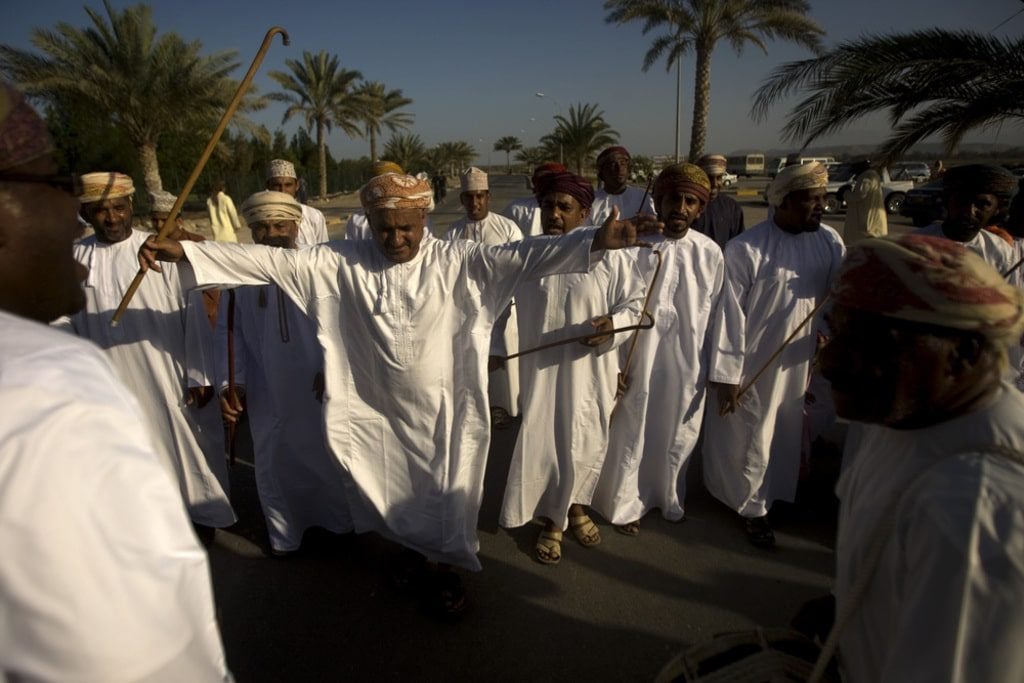
Oman’s rap and hip hop scene emerged around 2008 through online platforms on which local rappers could ‘battle’ with regional rappers in individual or group tournaments. Today, although it is very YouTube-based, it is still overlooked, regionally and in the rest of the world.
The only article about Omani rappers that has made it into the international media is a BBC interview from July 2017 with Muhannad al-Adwani, better known as Hanood, about his humorous cover of Luis Fonsi’s hugely successfuly ‘Despacito’. The song, which complains about the high price of marriage dowries in Oman, became an internet sensation, receiving more than a quarter of a million views in its first 24 hours online.
Two young men called Yousuf al-Taei, 23, and Ahmed al-Hamrashdi, 28, decided to open an Instagram page and a YouTube channel called Fenn al-Qawafi, which means the art of rhymes. Launched in August 2017, Fenn al-Qawafi aims to showcase local rappers online, organize musical events and draw attention to the local scene. “We saw that Oman’s rap scene is overlooked and the artists hard to find,” al-Taei told Fanack Chronicle. “Through this [platform], we gather the artists and have more visibility.”
They have organized two events so far, the first in November 2017, where over 20 rappers performed, but it attracted only around 450-500 people, and the second at the end of December. This time, they managed to bring in the famous Saudi Arabian rapper Klash to judge local performers in a competition, which attracted around 2,500 people.
Their next event is scheduled for mid-April, with rappers from the United Arab Emirates and Saudi Arabia performing alongside local ones.
“The rap scene is not seen in a good light; older generations see rap as something not very cultural or sophisticated,” al-Taei added. “It makes it difficult to approach companies to sponsor events, and there is no governmental support at all.” Their platform is essential to insure that Omani artists get their share of exposure, as most of them still work full time. “It started to change last year,” al-Hamrashdi said to Fanack Chronicle. “New talents are popping up, and people are starting to be interested in what we do. Anyone with a good network and talent can do it, it’s all about time.”
Most Omani rappers sing in Arabic because only a few of them understand and speak English. “At the beginning, rappers would write songs insulting each other,” al-Taei said. “But here it’s the best way to get your name out, through a dicing competition. Omanis have always been into a certain rap format because of the art of poetry called Midan, where two poets on a stage would creatively make the other person look bad. A lot of rappers have poets in their family, it’s an accessible art.”
In its early day, Omani rap was an underground scene, but 2016 saw the scene expanded by new songs and rappers. “Now, individuals and groups issue a track a month, they really enjoy this art,” al-Hamrashdi said. Two popular groups are Death Shot and The_B’z, who focus more on displaying their rap skills than conveying strong messages.
Other rappers talk about social issues without getting too political, for example by taking the perspective of a person struggling with a problem instead of talking about the cause of the problem, such as R.b2 hand black and YoUnG_a, who both rap about the difficulty of finding a job. “But they do it in a funny way,” al-Taei said. “Others will sing about their life, friends who passed away and a lot about their mothers! But most of them don’t get too serious and prefer to create punchlines, show their strengths and create tensions with other groups.”
Another young rapper, 22-year-old Abood Snoopy, and has been rapping since 2012 about himself, his life but also the political situation in the Arab region. Inspired by the Gulf countries and Saudi Arabian rap scene, he started to listen to them before trying for himself. With his group MCT Legends, he uploaded tracks online through special rap platforms before turning to YouTube in 2015. “Everyone is busy with his own life, even me I am finishing a master’s of law,” he told Fanack Chronicle. “So sometimes I make a track on my own with the name of the band.”
He is very optimistic about the future of Oman’s rap scene. “A lot of new listeners are starting to be interested in us and our lyrics. In 2017, the scene was united behind one track, ‘Oman Cypher’, and we got almost 130,000 views. People from the Gulf are starting to know our scene, and more companies are interested in sponsoring rap events. Also, the concert with Klash allowed some artists to be introduced as well; it is big.” He is now waiting for new opportunities to grow in his art and export his music.

